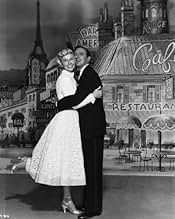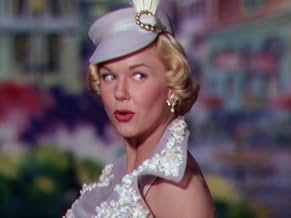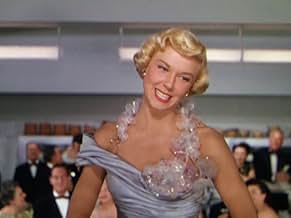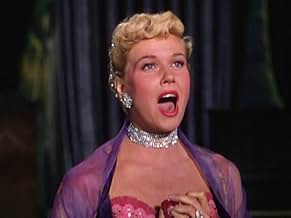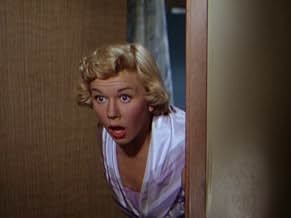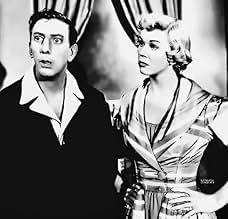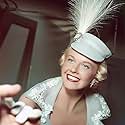AVALIAÇÃO DA IMDb
5,9/10
1,6 mil
SUA AVALIAÇÃO
Adicionar um enredo no seu idiomaA series of misunderstandings leads to a chorus girl traveling to Paris to represent the American theater, where she falls in love with a befuddled bureaucrat.A series of misunderstandings leads to a chorus girl traveling to Paris to represent the American theater, where she falls in love with a befuddled bureaucrat.A series of misunderstandings leads to a chorus girl traveling to Paris to represent the American theater, where she falls in love with a befuddled bureaucrat.
Aladdin
- Violinist - 'Rock the Boat Tonight' number
- (não creditado)
Leon Alton
- Stagehand
- (não creditado)
Betty Arlen
- Young Woman
- (não creditado)
Frank Baker
- Delegate
- (não creditado)
Doris Barton
- Chorus Girl
- (não creditado)
Mary Bayless
- Ship Passenger
- (não creditado)
Mary Benoit
- Secretary
- (não creditado)
Avaliações em destaque
A late-night viewing of this period piece shows it to be a charming and amusing glimpse into an earlier time. Doris Day holds up well, brightly singing, dancing, and portraying the all-American girl with gumption. Bolger's dancing is phenomenal, but the chemistry between them is not really there; it's hard to believe they really like each other very much. The costumes are outrageous in a campy way - almost Busby Berkley level synchronized dance scenes. A fashion-show scene shows overdone eccentric outfits in various colors, with French poodles dyed to match. In the last musical scene, Doris starts out with a floor-length gold cape with mini-pleats radiating from her shoulders; and then takes it off to show a bare midriff any current teenager would be proud of. The movie opens with some vintage scenes (current to the time of the film) of Washington DC, complete with streetcars. But the most anachronistic element is the main theme of the plot, which revolves around Bolger and Day coming close to sleeping together, thinking they are legally married, when in fact (horrors!!) they're not. In summary, it's a great combination of lightweight plot, eye candy, good music and a few laugh-out-loud lines, wrapped in the relative innocence of the fifties.
True, even for the breezy 1950s, the plot for this musical is as light as a feather--but if you are a DORIS DAY fan, as I certainly was during these early Day films at Warner Bros., you'll be enchanted by her way with a song--particularly "I'm Gonna Ring the Bell Tonight", "April in Paris" and "That's What Makes Paris Par-ee". And on top of that, she excels in all of her dance routines, even those in which RAY BOLGER clearly has the spotlight to himself.
It's one of those mistaken identity plots that Warners used extensively throughout the '40s and '50s, something about a showgirl being mistaken for a diplomat and mistakenly invited to represent the U.S. at a French festival. Naturally, all is straightened out in time for a happy ending although I can't say I detected any real chemistry between Bolger and Day--even in a musical where logic doesn't really matter.
The dances staged by LeRoy Prinz are not the best, but there are some cheerful, well staged moments when Bolger gets to do his tap routines and limber legged dancing. All in all, it passes the time pleasantly if you have a weakness for musicals the way they were in the '50s. And Doris proves that singing wasn't her only asset. Her dancing is also very professional (and not surprisingly, she intended to become a dancer before an accident ruined her plans and she switched to singing).
It's one of those mistaken identity plots that Warners used extensively throughout the '40s and '50s, something about a showgirl being mistaken for a diplomat and mistakenly invited to represent the U.S. at a French festival. Naturally, all is straightened out in time for a happy ending although I can't say I detected any real chemistry between Bolger and Day--even in a musical where logic doesn't really matter.
The dances staged by LeRoy Prinz are not the best, but there are some cheerful, well staged moments when Bolger gets to do his tap routines and limber legged dancing. All in all, it passes the time pleasantly if you have a weakness for musicals the way they were in the '50s. And Doris proves that singing wasn't her only asset. Her dancing is also very professional (and not surprisingly, she intended to become a dancer before an accident ruined her plans and she switched to singing).
Easily the worst film Doris Day ever made. She plays a brassy show girl from New York who is mistakenly invited to represent the USA at a cultural shindig in Paris. The stuff-shirt dope who made the error is played by Ray Bolger (nearly 20 years Day's senior). Neither Day nor Bolger manage to stay in character.
Title song aside, all the other songs stink. Claude Daupin occupies a dumb subplot about a Frenchman trying to get home without any money to pay for a passage on the ocean liner ... even though he's a famous impresario. Paul Harvey plays the senior US official and Eve Miller (she's terrible) plays his daughter who's supposedly engaged to Bolger.
Day and Bolger did not get along during production and it shows. Even under the best of circumstances, it's unlikely there would have been any chemistry between them. Bolger had a reputation for upstaging his fellow performers and acting like a prima donna. Having said that, it's amazing how many off-key notes he hits in his opening song-and-dance number. Painful.
Bolger had made a hit on Broadway with 1948's "Where's Charley?" and he starred in the film version the same year he made this film with Day. It was his last starring role in a film.
The cheesy sets and lackluster supporting cast add to the misery. Director David Butler, who had been an actor in silent films, directed Day in several other films with much better results. Bolger seems to be the fly in the ointment.
Title song aside, all the other songs stink. Claude Daupin occupies a dumb subplot about a Frenchman trying to get home without any money to pay for a passage on the ocean liner ... even though he's a famous impresario. Paul Harvey plays the senior US official and Eve Miller (she's terrible) plays his daughter who's supposedly engaged to Bolger.
Day and Bolger did not get along during production and it shows. Even under the best of circumstances, it's unlikely there would have been any chemistry between them. Bolger had a reputation for upstaging his fellow performers and acting like a prima donna. Having said that, it's amazing how many off-key notes he hits in his opening song-and-dance number. Painful.
Bolger had made a hit on Broadway with 1948's "Where's Charley?" and he starred in the film version the same year he made this film with Day. It was his last starring role in a film.
The cheesy sets and lackluster supporting cast add to the misery. Director David Butler, who had been an actor in silent films, directed Day in several other films with much better results. Bolger seems to be the fly in the ointment.
This is a pleasant but basically forgettable musical from a decade that produced far better. The performers are all talented and have done much better elsewhere; they are not to blame. The script is basically boring, and the title very misleading: only the last 15 minutes or so of the movie takes place in Paris. And when it does, it's all painted backdrops. We never really get to Paris.
What I found interesting was the post-WW II notion that Americans are very up-tight, especially sexually, and that a trip to Paris could do wonders to loosen them up. (This idea is well presented in the great 1948 Billy Wilder movie, "A Foreign Affair," though there Paris is not the answer, it's just getting out of the American mindset and encountering Europeans.) One of the bright spots of the movie is Doris Day's dance-and-sing number on the ship, "I'm gonna ring the bell tonight," when she encounters the "joie de vivre" of the French crew on the ocean liner and starts to loosen up herself.
For what it's worth, the setting for this number seems to have been taken from a Jane Powell movie from four years before, *Luxury Liner*. Jane's character does an interesting - but not as interesting - number in the kitchen of the title's luxury liner with the kitchen staff early in the movie.
Later, there is a decent number with Day and the Frenchman, Philippe Fouquet (Claude Dauphin, playing the role that Georges Guétary had played so much better the year before in "An American in Paris") in which the appeal and disappointments of Paris are sketched out.
In sum, this is a pretty forgettable movie: forgettable music, certainly, forgettable dialog mostly (though there are a few nasty lines between Day and her female rival), unremarkable story - you never believe there is any real feeling between Ray Bolger and Day - forgettable if energetic dancing. Coming a year after "An American in Paris" - and no doubt meant to play off the success of that movie - this is pretty much a letdown. Even the scenes of Paris are fake.
What I found interesting was the post-WW II notion that Americans are very up-tight, especially sexually, and that a trip to Paris could do wonders to loosen them up. (This idea is well presented in the great 1948 Billy Wilder movie, "A Foreign Affair," though there Paris is not the answer, it's just getting out of the American mindset and encountering Europeans.) One of the bright spots of the movie is Doris Day's dance-and-sing number on the ship, "I'm gonna ring the bell tonight," when she encounters the "joie de vivre" of the French crew on the ocean liner and starts to loosen up herself.
For what it's worth, the setting for this number seems to have been taken from a Jane Powell movie from four years before, *Luxury Liner*. Jane's character does an interesting - but not as interesting - number in the kitchen of the title's luxury liner with the kitchen staff early in the movie.
Later, there is a decent number with Day and the Frenchman, Philippe Fouquet (Claude Dauphin, playing the role that Georges Guétary had played so much better the year before in "An American in Paris") in which the appeal and disappointments of Paris are sketched out.
In sum, this is a pretty forgettable movie: forgettable music, certainly, forgettable dialog mostly (though there are a few nasty lines between Day and her female rival), unremarkable story - you never believe there is any real feeling between Ray Bolger and Day - forgettable if energetic dancing. Coming a year after "An American in Paris" - and no doubt meant to play off the success of that movie - this is pretty much a letdown. Even the scenes of Paris are fake.
Doris Day as Ethel 'Dynamite' Jackson gets a letter from the State Department saying that she's been chosen to be an American representative at an Arts Festival in Paris. The letter was supposed to go to Ethel Barrymore instead. Doris had written the State Department about a work permit visa to work at a nightclub in Montreal.
It's a faux pas of the highest order that State Department bureaucrat Ray Bolger has committed and he tries to rectify the situation. But when the press gets a hold of it, the thing becomes a popular move. So Bolger's boss Paul Harvey puts him in charge of getting Doris's diplomatic etiquette up to speed. For better or worse Bolger and Day are going to spend April In Paris together.
The popular Vernon Duke-E.Y. Harburg standard serves as the title for this film and Warner Brothers got Vernon Duke to write the balance of the score with Sammy Cahn's lyrics. Nothing really outstanding here, but the score fits well with styles of the two leads.
Doris is great as always, the problem here is Bolger and the part he plays. Ray Bolger was a great personality on stage who but for two roles never quite was able to translate the same popularity to the big screen. One role was of course the Scarecrow in The Wizard Of Oz and the other was the lead in Charley's Aunt. And both of those were comic parts.
As a traditional screen lead Ray never quite made it. In fact in watching April In Paris I couldn't quite see what Doris saw in him. Of course with her attraction it was obvious as Bolger so succinctly put it, 'What a Built'. Ray plays a traditional WASP stuffed shirt diplomat who is engaged to the demanding daughter of Harvey, Eve Miller. Getting involved with Day was not an upward career move.
Of course Doris sparks the attention of Claude Dauphin who's working his way back to France on the same ship that Bolger and Day and company are traveling. She has a nice number with Dauphin in a Parisian nightclub.
Bolger's big moment on the screen is a very nicely staged fantasy number where portraits of Lincoln and Washington come alive and dance with him as Bolger dreams about his future. It was as creative as something Gene Kelly or Fred Astaire might have done.
Still Ray is not quite leading man material and the film can't overcome that. Fans of Doris and Ray will like it though, but I fear it's not one of Doris Day's best films.
It's a faux pas of the highest order that State Department bureaucrat Ray Bolger has committed and he tries to rectify the situation. But when the press gets a hold of it, the thing becomes a popular move. So Bolger's boss Paul Harvey puts him in charge of getting Doris's diplomatic etiquette up to speed. For better or worse Bolger and Day are going to spend April In Paris together.
The popular Vernon Duke-E.Y. Harburg standard serves as the title for this film and Warner Brothers got Vernon Duke to write the balance of the score with Sammy Cahn's lyrics. Nothing really outstanding here, but the score fits well with styles of the two leads.
Doris is great as always, the problem here is Bolger and the part he plays. Ray Bolger was a great personality on stage who but for two roles never quite was able to translate the same popularity to the big screen. One role was of course the Scarecrow in The Wizard Of Oz and the other was the lead in Charley's Aunt. And both of those were comic parts.
As a traditional screen lead Ray never quite made it. In fact in watching April In Paris I couldn't quite see what Doris saw in him. Of course with her attraction it was obvious as Bolger so succinctly put it, 'What a Built'. Ray plays a traditional WASP stuffed shirt diplomat who is engaged to the demanding daughter of Harvey, Eve Miller. Getting involved with Day was not an upward career move.
Of course Doris sparks the attention of Claude Dauphin who's working his way back to France on the same ship that Bolger and Day and company are traveling. She has a nice number with Dauphin in a Parisian nightclub.
Bolger's big moment on the screen is a very nicely staged fantasy number where portraits of Lincoln and Washington come alive and dance with him as Bolger dreams about his future. It was as creative as something Gene Kelly or Fred Astaire might have done.
Still Ray is not quite leading man material and the film can't overcome that. Fans of Doris and Ray will like it though, but I fear it's not one of Doris Day's best films.
Você sabia?
- CuriosidadesDoris Day wrote in her autobiography that she only encountered trouble or tension on two of her Warner Bros. movies: 'April in Paris' and Corações Enamorados (1954). Regarding this film, she claimed that leading man Ray Bolger and director David Butler clashed early on, with Butler accusing Bolger of trying to steal scenes away from Day. She also mentioned that being a relative newcomer to movies, she was unaware of Bolger's tricks and managed to stay out of the line of fire.
- Erros de gravaçãoRay Bolger supposedly flies to New York when he realizes the invitation mixup, but the plane is shown flying over the Wrigley Building in Chicago.
- Citações
Ethel S. 'Dynamite' Jackson: It's no use, Philippe. I'm in love with the man I married. And he's not even my husband!
Philippe Fouquet: Even in Paris, that's an unusual situation.
- ConexõesFeatured in IMDb Originals: Doris Day: In Memoriam (2019)
Principais escolhas
Faça login para avaliar e ver a lista de recomendações personalizadas
- How long is April in Paris?Fornecido pela Alexa
Detalhes
- Data de lançamento
- País de origem
- Idiomas
- Também conhecido como
- París en Abril
- Locações de filme
- Empresa de produção
- Consulte mais créditos da empresa na IMDbPro
- Tempo de duração
- 1 h 40 min(100 min)
- Proporção
- 1.37 : 1
Contribua para esta página
Sugerir uma alteração ou adicionar conteúdo ausente


